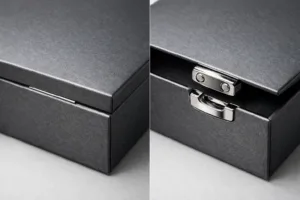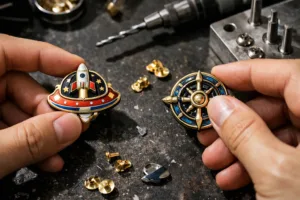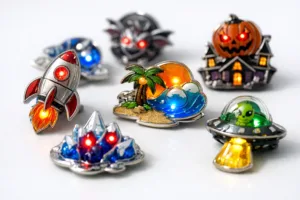Perfume Packaging Trends 2025: The Role of Bottle Caps in Branding
As the fragrance industry evolves, perfume packaging trends 2025 cast a spotlight on fine details—the subtle elements that transform a scent into a compelling brand statement. At the very heart of these trends lies the perfume cap: functional yet uniquely expressive, it stands as the silent ambassador for fragrance brands navigating the ultra-competitive luxury market.
Perfume Packaging Trends 2025: The Role of Bottle Caps in Branding
In 2025, perfume packaging trends move beyond aesthetics to emphasize strategic brand differentiation. The bottle cap has emerged as a powerful branding asset, balancing design, material choice, and functionality. For brands seeking to make lasting impressions, the cap not only seals the fragrance, but also conveys the story, values, and prestige of the product inside.
Why Bottle Caps Matter: A Brand’s First Impression
The perfume cap is far more than a lid—it’s a tactile, visual, and psychological touchpoint. Leading fragrance houses invest heavily in custom cap design to capture consumer attention on crowded retail shelves and convey crucial brand cues. Distinctive caps with signature finishes or intricate relief logos create instant recognition, while the satisfying weight of a well-crafted metal closure signals luxury and permanence.
Brand Storytelling Through Cap Design
Storytelling is an increasingly vital strategy in 2025. Many brands use bespoke caps featuring 3D relief motifs, precision engravings, or even embedded gemstones to communicate heritage or exclusivity. The cap’s shape, texture, and finish provide a miniature canvas for brand expression, from minimalistic sophistication to ornate artistry.
Functional Innovation and Consumer Experience
Functionality drives many innovations, with advancements in ergonomic forms and secure magnetic closures that enhance user experience while reinforcing the brand’s commitment to quality. Tolerances within +/-0.05mm and hardness levels (HV 80–100 for premium alloys) ensure reliable feel and performance over repeated use.
Material Evolution: Metals Taking Center Stage
While traditional plastic remains an option for cost-sensitive applications, premium fragrance brands increasingly choose metal caps. 2025 sees a surge in use of zinc alloy, brass, and stainless steel, valued for their durability, heft, and the elevated look they bring to shelf and hand alike.
Zinc Alloy: Versatility and Precision
Zinc alloy’s low melting point allows for intricate die-cast shapes, deep 2D/3D relief, and sharp logo detailing. It supports a range of finishes, from antique brass to electroplated chrome, and maintains strict dimensional tolerances—essential for seamless, wobble-free capping on glass bottles.
Brass and Stainless Steel: Prestige and Longevity
Brass offers warmth and elegance, with the option for hand-brushed, mirror-polished, or even patinated finishes. Stainless steel (304/316 grades) excels in corrosion resistance and is suitable for caps requiring high polish or satin textures, especially in humid environments or prestige gift packaging.
| Material | Production Method | Finish Options | Best Use |
|---|---|---|---|
| Zinc Alloy | Die Casting | Antique, Polished, Chromed, Matte | Custom 3D, Mass Production |
| Brass | CNC/Stamping | Brushed, Mirror, Satin | Luxury/Limited Edition |
| Stainless Steel | CNC/Stamping | Polished, Satin, Sandblasted | High-End, Moisture-Prone Markets |
Design Directions Shaping 2025
The interplay of aesthetics, engineering, and sustainability shapes the year’s most sought-after perfume cap designs. Collaboration with experienced OEM/ODM partners, such as Gairun—renowned for precise metal craftsmanship and robust plating controls—gives brands access to premier finishing and assembly options.
Minimalism Meets Artisanal Detailing
Modern fragrance brands embrace clean, geometric shapes, often accentuated by single accent grooves, subtle logo embossing, or satin-brushed textures. Limited editions may feature hand-applied patina or mixed-metal elements, blurring the line between sculpture and packaging.
Custom 3D Relief and Engraving
Increasingly accessible die casting and wire EDM technologies enable intricate cap shapes and richly textured surfaces. Brands deploy multi-height 3D logos and custom patterns, supported by precise mold engineering and finishing lines that control plating thickness (e.g., 8–12μm for gold, 10–15μm for nickel) with XRF checks for consistency.
- High-relief logos for instant shelf recognition
- Fluting and knurled edges for improved grip and tactile appeal
- Bi-metallic caps (e.g., brass core, zinc overlays) for luxury segment
- Magnetic closures for smooth, precision-aligned fit
Finishes and Plating: Elevating Tactile and Visual Experience
Finish is where function meets emotion in bottle cap design. In 2025, demand increases for advanced plating and texturing techniques—with manufacturers like Gairun combining electroplating, PVD (physical vapor deposition), and powder coating to achieve custom color matches and resilient surfaces.
Popular Finishes and Their Impacts
| Finish | Properties | Best Used For |
|---|---|---|
| Matte Black PVD | High scratch resistance, modern look | Unisex, minimalist lines |
| Rose Gold | Warmth, high-end appeal | Prestige women’s fragrances |
| Brushed Nickel | Subtle texture, reduced fingerprints | Limited editions, tactile focus |
| Antique Brass | Vintage, artisanal feel | Heritage brand lines |
| Mirror Polish Chrome | Bright luster, bold reflections | Men’s and ‘statement’ scents |
Technical Quality Controls
Consistency matters. Leading manufacturers enforce strict AQL sampling, test plating adhesion per ASTM D3359, and verify resistance to tarnishing using salt-spray chambers per ASTM B117, often exceeding 48–96 hour benchmarks for export markets. Compliance with RoHS/REACH and EN 1811 nickel release regulations safeguards against heavy metal exposure, particularly for decorative caps on wearable gift sets.
Sustainability: Green Innovation in Perfume Cap Design
Eco-friendly initiatives are central to perfume packaging trends 2025. Metal caps, often designed for reusability or recyclability, help brands meet rising consumer expectations for low-carbon packaging. New anodizing and PVD processes minimize waste and enable durable, non-toxic finishes. Brands also explore bio-based inserts, FSC-certified paper seals, and minimalist cap designs with reduced material mass.
Comparative Sustainability Table
| Material | Recyclability | Carbon Footprint | Eco Advocates |
|---|---|---|---|
| Aluminum | High | Low with post-consumer content | Sustainable ranges |
| Zinc Alloy | Moderate-High | Moderate | Reusable, luxury lines |
| Plastic (ABS/PP) | Low-Moderate | Higher | Mass-market, budget |
Personalization and Limited Editions: Custom Cap Strategies
Personalization continues its rise into 2025. Brands commission limited-edition cap runs—using laser engraving for initials or unique patterning, often on lower volume, high-margin fragrances. Rigorous color difference (ΔE <3.0 for Pantone matching) and fill depth controls enable short-run creativity without sacrificing visual unity across product lines.
Assembly Methods for Unique Presentation
Premium assembly techniques play a role in limited editions:
- Magnetic closures for easy alignment and tactile satisfaction
- Screw-thread connections with tamper-evident collars
- Mixed material inserts—wood, glass, sustainable resin—for sensory contrast
Gairun’s Approach to OEM/ODM Perfume Cap Excellence
Gairun’s expertise in die casting, surface finishing, and compliance ensures each cap meets both aesthetic and technical standards. Their investment in advanced mold production (CNC and wire EDM), precise deburring, and multi-stage polishing supports flawless cap geometry and mirror or satin effects. For B2B buyers, Gairun’s ability to integrate branding elements—custom logo relief, Pantone-matched enamel infill, or controlled plating thickness—enables distinctive, enduring cap designs at a global scale.
B2B Buying Guide: Key Considerations for Perfume Cap Procurement
For fragrance brands, selecting the right cap design partner is as much a technical exercise as it is a creative one. Critical considerations include:
- Material Selection: Choose metal for luxury and eco impact, considering cost, weight, and finish options.
- Process Expertise: Die casting for sculptural relief; CNC for ultra-precise geometric forms.
- Finish Quality: Demand stringent controls (AQL, salt-spray, color uniformity) and RoHS/REACH compliance.
- Branding Integration: Opt for OEM/ODM services with flexible mold and logo design capabilities.
- Supply Assurance: Seek proven partners like Gairun for reliable, scalable B2B service.
Future Outlook: Trends Beyond 2025
Looking ahead, bottle cap design will continue to blur the boundary between packaging and art object. Expect to see greater adoption of smart materials (e.g., sensory-activated color shifts), collaborative artist editions, and cap-integrated authentication features for traceability. The continual pursuit of craftsmanship—tempered by sustainability imperatives—will ensure bottle caps remain at the forefront of perfume brand expression.
Expert Takeaway: “In 2025, the perfume cap—engineered for precision, finished for prestige, and designed for recyclability—anchors a brand’s shelf presence and cements its market identity.”
Frequently Asked Questions
What metal materials are most popular for perfume bottle caps in 2025?
Zinc alloy, brass, and stainless steel are preferred for their versatility, precise finishes, and ability to deliver a luxury feel that enhances brand value.
How do custom metal caps support fragrance brand storytelling?
Custom relief, engraving, and distinctive finishes on metal caps help visually communicate a brand’s history, values, and exclusivity, engaging consumers instantly.
What finishing techniques are trending in perfume cap design?
Electroplating, PVD, powder coating, mirror and satin polishing, and hand-applied patina are in demand for their high aesthetic impact and durability.
How do manufacturers ensure quality and consistency in cap production?
Leading vendors employ strict AQL sampling, plating thickness inspections, salt-spray tests, and color difference controls, while complying with RoHS/REACH standards.
Why is sustainability influencing perfume cap trends in 2025?
Brands and consumers increasingly favor recyclable metals, reduced-mass designs, and low-impact finishes to align with environmental values and regulations.
What should B2B buyers look for when sourcing custom perfume caps?
Key considerations are material expertise, advanced processing, finish quality assurance, compliance, and OEM/ODM capabilities for tailored branding solutions.







